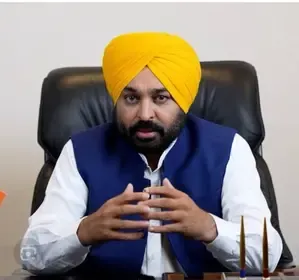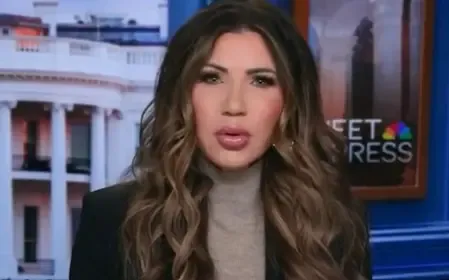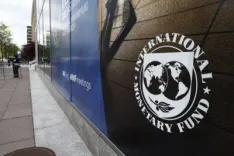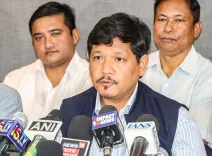Is the BJP Playing a Dirty Game with Punjab's Water?

Synopsis
Key Takeaways
- Punjab's water situation is critical, with low levels in major dams.
- The BJP is accused of manipulating water resources for political gain.
- Punjab has modernized its irrigation systems but needs more water.
- Farmers are facing severe challenges due to water shortages.
- Maintaining agricultural productivity is essential for national food security.
Chandigarh, April 29 (NationPress) Claiming that the BJP is engaging in a malicious strategy to redirect excess water to Haryana, Punjab Chief Minister Bhagwant Singh Mann asserted on Tuesday that they will not permit this ill-intentioned plot against the state to succeed.
The Chief Minister urged the Union government to reroute the waters of the Chenab, Jhelum, Ujh, and other rivers to northern states to meet the demands of the upcoming paddy season due to the suspension of the Indus Water Treaty with Pakistan.
Mann pointed out that Haryana and Rajasthan have already been allocated their water shares, revealing that Haryana consumed its entire quota in March this year. Consequently, they are now attempting to seize additional water from Punjab’s allocation.
The Chief Minister noted that Haryana has already utilized 103 percent of its designated water and that the BJP at the Centre is pressuring Punjab to release more water to Haryana.
Mann lamented that the Bhakra Beas Management Board (BBMB) is being unlawfully exploited by the BJP to achieve this aim.
He emphasized that unlike his predecessors who used to grant such favors to appease BJP leaders, he, as the guardian of Punjab’s water resources, will never allow such actions.
Punjab has modernized its canal water system, necessitating more water to support its farmers as the paddy season approaches.
The Chief Minister firmly stated that Punjab does not possess a single drop of water to share with other states. He mentioned that Punjab has already provided 4,000 cusecs of water to Haryana for humanitarian purposes to meet their drinking water requirements.
Mann expressed concern over the dire state of water availability, noting that the levels in the Ranjit Singh Dam and the Pong Dam are currently 39 feet and 24 feet lower, respectively, compared to the same time last year.
He reiterated that there is no possibility of yielding to pressure on this matter, as it directly affects the farmers of Punjab.
Mann insisted that instead of engaging in these unlawful tactics, the Union government should redirect the waters of the Chenab, Jhelum, Ujh, and other rivers to Punjab by nullifying the controversial Indus Water Treaty with Pakistan.
“Rather than illegally pressuring us, the Haryana government should have managed their water share wisely,” he remarked.
The Chief Minister cautioned the BJP against politicizing this critical issue, emphasizing that water is an essential resource for both the state and its farmers.
Mann highlighted that Punjab contributes 185 metric tons of paddy to the national food supply and will not succumb to the BJP's tantrums.
He reaffirmed that the state has no surplus water to distribute to any other state, stating that not even a single drop will be shared.
Most regions in Punjab are facing severe over-exploitation, and the groundwater situation is exceedingly concerning. Additionally, with many of the state's river resources having dried up, the need for more water for irrigation is crucial.










